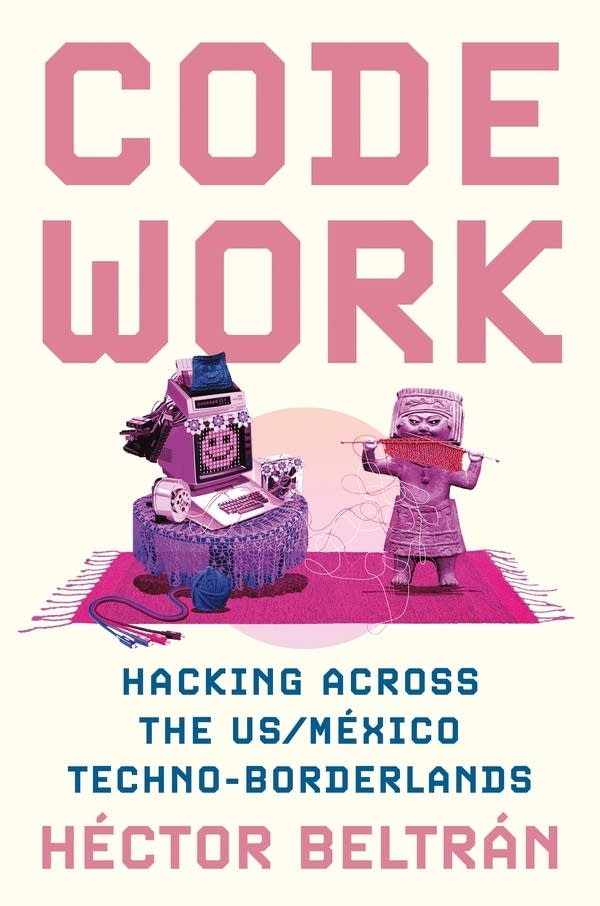Héctor Beltrán, author of “Code Work,” explains what some hacker-entrepreneurs in Mexico do to get their ideas to U.S. venture capitalists.

Every tech company needs a good origin story. The startup garage, the dorm room and the hacker house are firmly embedded in American tech mythology.
For hacker-entrepreneurs in Mexico, the border with the U.S. looms large. A subset of them hope to one day cross it and pitch their big idea to venture capitalists in Silicon Valley. One way there is to work the hackathon circuit in Mexico. That’s the subject of “Code Work: Hacking across the US/México Techno-Borderlands,” a new book by Massachusetts Institute of Technology anthropologist Héctor Beltrán.
Beltrán details how coders gain currency in the field by participating in hackathons. Mexican politicians get something out of them too. The events are frequently sponsored by the government, with big promises of funding and support. But the prize, all too often, is a handshake and photo op with a public official, and maybe a thank-you letter, but no real investment.
The following is an edited transcript of Beltrán’s conversation with Marketplace’s Lily Jamali.
Lily Jamali: You open your first chapter of the book at a hackathon in 2015 in Mexico. There is a distinct government presence at this event. What is in it for the politicians? Why do they so want to be associated with these hackathons in Mexico?
Héctor Beltrán: As these new campaigns, new politicians emerge, the entrepreneurs and these hacker-entrepreneurs emerged as these ideal subjects to work with who could take matters into their own hands and resolve some of these [social] issues. So [politicians] wanted to be close to the young, to the new, but also to these self-conscious, younger folks who were apparently solving some of the issues they were being pressured to solve themselves from the perspective of the state.
Jamali: You really place us inside of these events, these hackathons in Mexico, and it’s clear that there are distinct cultures at various ones. Some look a lot like what you might find in Silicon Valley. Others adopt what you call radical leftist discourse and imagery, including Zapatista posters. Were you surprised to find almost a disdain for Silicon Valley at some of the hackathons that you attended?

Beltrán: Yeah, it’s interesting. So I’d show up in these more open-source-leaning groups who were more inclined to think with leftist politics, Zapatista politics in general, and just sort of think from below in different ways. But then I thought, “Wait a minute, I’m an anthropologist, I can’t just tell one side of the story.” There’s also these hackathons sponsored by Google and other big companies. I need to go check out how people are thinking of hacking there. So I started going to those as well. So it was this moment when I saw that young people are also traversing these seemingly contradictory spaces. Like, why are they doing this? What are they getting out of it? What does it tell us about the contemporary moment that perhaps you have to cross these political, social, cultural divides to think more critically, or to even gain value in what you’re doing with your work?
Jamali: And as you describe it in the book, there’s some code-switching involved in toggling between these different worlds.
Beltrán: Yeah, code-switching in many respects, so not just language. So one thing about thinking about Silicon Valley hacking, entrepreneurship from Mexico: The first part is thinking of it as Mexico, as people from a broader Global South, trying to break into cultures of hacking and entrepreneurship, receiving recognition. I mean, people value their interventions. So one of the concepts in anthropology of hacking is that the Global South might be wanting to break into these global cultures of computing, whereas Global North people might be trying to break out of what they see as limitations. So it’s interesting to think about different ways to approach hacking and entrepreneurship. But another thing specifically with Mexico is the proximity with the U.S. and some of these people — there’s different code workers here, different privileges — but some of them were able to participate in some of the events in Silicon Valley and cross the physical border back and forth to experience cultures themselves from different angles. And there was code-switching in terms of language, culture, this type of thing, but also how they presented their selves to investors, to people in the more radical worlds, to people in the tech startup worlds. So there’s this play with performances of your hacker-entrepreneur self across these very different spaces that I really tried to get at this book and why it’s important to think about this code-switching.
Jamali: Yeah, and sticking with that theme, one person you describe in the book who really stuck with me is Javo, a coder who comes up with an app that uses Twitter to fight political corruption in Mexico. He’s one of those who ends up winning a coveted trip to Silicon Valley to pitch, and he pivots his entire project when he’s there to something that looks more like Uber Eats. So as you describe it “from politics to pizza delivery.” What should we take away from that pivot that Javo makes and why he feels compelled to make it?
Beltrán: Yeah, so it’s interesting. This is one of the more challenging parts of my research, in terms of giving credit for the work being done, perhaps seeing some more critical aspects of the work than perhaps the research participants do with thinking about just the different ways we enter these worlds, both the hacking worlds and the techno-entrepreneurship world. So as you mentioned, this app receives large investments from Silicon Valley. It starts as this project in Mexico to combat voter fraud. But one of the things they say as well, “para tener impacto necesitas feria” — or “you need money to create an impact.” You know, coming from the Global South, you need money and resources to make some of these projects work. So very smart, young people who traveled to Silicon Valley receive investments for pivoting their framework to deliver pizzas on a Twitter platform. So they follow the market — you know, there’s no market, perhaps, in combating voter fraud, but there’s a market in food delivery.

And they were all about their technology. So they started thinking, for people to communicate without internet access — which is a very common problem in parts of the world that aren’t in the Global North, where we’re so used to just being connected — and they saw this as a possibility as well. And once they started developing these lower layers of what I call, or what is the computing stack, sort of thinking at the layer of the app, they’re thinking about devices actually communicating. They started really working on mesh networking and trying to sell this technology instead of their app. Eventually, it pivoted into this app for people communicating where they might not have internet connection, so using device-to-device mesh networking to communicate. And they saw that, hey, this is a way to also gain more users, which is another thing you’re taught [in Silicon Valley] — maybe if you don’t know how to make money off this, just get a lot of users, and eventually it’ll come. And we saw that this was being used, all of a sudden, by protesters in different parts of the world. So in this pivoting, throughout the lean startup methodology, from the tech startup worlds, it eventually comes back to politics in an unexpected way. It’s an interesting story to think with, in terms of how all of these different inequalities and angles come together.
Jamali: So if coders are feeling disenchanted with almost having to perform a certain role, why do you think they feel compelled to keep participating?
Beltrán: Coding teaches you to think, it teaches you to think across layers of abstraction. But also, there’s this kind of magical aspect in coding that’s something behind the scenes. If you put an interface for another coder to interact with, you’re keeping part of it to yourself, perhaps. So there’s this, I want to say, magical element to coding where you hide parts of a system, parts of yourself to different investors, to different entities. That’s what’s attractive to many people that get into the code worlds, I want to argue.
Jamali: So in the book, you acknowledge the support you received from your parents and from your “chaparritas,” or “little ones,” throughout your academic journey. How do you connect with “Code Work,” the book, on a personal level?
Beltrán: So it’s a book about technology, computing, techno-entrepreneurship, Silicon Valley, my own intervention as someone who gets to move between these spaces, as someone who’s valued as an MIT programmer, because that’s where I went, and thinking about these dimensions of difference. Ultimately, it’s about difference, thinking about Silicon Valley from Mexico; also, from a Chicano/Latino perspective, because as I show throughout the book, there’s these connections, tensions, intersections between the Latino community in the U.S., the Latin American community, the Mexican community. How do they come together? What are the tensions? “Techno-Borderlands” is ultimately about these disconnections, connections and what it means to think from below or from the south — not only the Global South, but from these previously undervalued or subjugated knowledges, thinking from the social sciences.